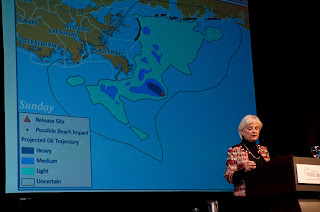Most everyone in the attendance at TOPHC’s second plenary session on Thursday morning knew of the massive British Petroleum oil spill that took place in the Gulf of Mexico, off of the coast of
LuAnn White, director of the Tulane Center for Applied Environmental Health (CAEPH), in New Orleans
“If you’re not thinking in the long term,” said White, “you won’t be collecting the data you need to assess effects over time.” Establishing baseline data is critical.
White also detailed the environmental, economic and health-related after-effects of the spill – which ran contrary to what those with no direct connection to the region, or who rely on news reports for their information, may have come to believe.
She presented evidence indicating that the Gulf seafood appears safe to eat, the air quality appears not to contain oil-related toxins in harmful concentrations and the impact on marine and bird life was less than devastating. Perhaps most surprisingly, much of the oil either evaporated, or clumped together into relatively easily removable tar balls (not a scientifically accurate description, perhaps, but that’s the gist), and did not decimate the natural environment.
Most media outlets, though, seemed intent on drawing parallels between the Deepwater Horizon spill and that of the not-terribly-similar. Exxon Valdez in 1989. So the general public could only assume the worst, stop eating Gulf-area seafood and cancel trips to the region.
 “Communication is critical.” This message was echoed several times throughout the presentation, and was one of its most resounding “takeaways.” The necessity of having a communications “command central” and a tight control on information disseminated to the media and the public during the crisis was not without its drawbacks. And in other respects, the communications efforts came up short.
“Communication is critical.” This message was echoed several times throughout the presentation, and was one of its most resounding “takeaways.” The necessity of having a communications “command central” and a tight control on information disseminated to the media and the public during the crisis was not without its drawbacks. And in other respects, the communications efforts came up short.“We didn’t communicate the data well enough to counter the misperceptions,” said White, highlighting an ongoing challenge for scientists and public health professionals, and an uphill battle for Gulf-area interests even today.
Having the evidence or data is one thing. Finding a way to communicate it – so that it’s clear and comprehensible (and dare we say compelling) to a non-scientific audience, including the media, is another thing entirely. But it’s absolutely essential.



No comments:
Post a Comment